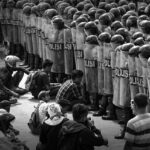Examining the Intersection of Fear, Governance, and Social Dynamics
Uttar Pradesh, India’s most populous state, has increasingly become a focal point for debates surrounding governance, social justice, and individual freedoms. With its rich cultural and philosophical history rooted in dharma (duty), karma (action), and ahimsa (non-violence), the state now faces criticism for an emerging culture of fear. Critics argue that governance strategies, societal pressures, and rising communal tensions are creating an environment that challenges democratic values and individual freedoms.
Key Highlights
- Rise in Fear-Based Policies: Reports of bulldozer politics and public shaming of alleged offenders have raised concerns about authoritarian governance.
- Social Polarization: Increased incidents of communal violence and caste-based discrimination are undermining social harmony.
- Freedom of Expression: Activists and journalists claim suppression of dissent through intimidation and legal threats.
- Historical Context: Philosophical traditions in UP, emphasizing justice and harmony, clash with the perceived erosion of these values in modern governance.
Fear as a Governance Tool
- Bulldozer Politics:
- Demolition drives targeting alleged encroachers have been lauded by some as swift justice but criticized by others as disproportionate punishment.
- Impact: Families and small businesses claim they are being unfairly targeted, leading to economic and psychological distress.
- Public Displays of Justice:
- Parading alleged offenders publicly has been used to send a message of deterrence.
- Criticism: Experts argue that such tactics erode the presumption of innocence and foster a culture of humiliation.
- Media and Dissent:
- Journalists and activists report increased legal scrutiny and surveillance, with dissenting voices facing lawsuits or arrests.
- Philosophical Clash: The suppression of expression stands in contrast to the dharmic principle of open dialogue and the pursuit of truth.
Social Issues Driving Fear
- Communal Tensions:
- Incidents of communal violence have increased, with polarized narratives fueling mistrust between communities.
- Philosophical Lens: The state’s traditions of inclusivity, reflected in the Bhakti and Sufi movements, are being overshadowed by divisive ideologies.
- Caste Discrimination:
- Dalits and marginalized communities report systemic discrimination and violence, with little accountability for perpetrators.
- Reality Check: While affirmative action policies exist, their implementation remains inconsistent, exacerbating social inequality.
- Gender-Based Violence:
- High-profile cases of violence against women have highlighted gaps in law enforcement and judicial processes.
- Philosophical Perspective: The principles of ahimsa and respect for all are undermined by such incidents, calling for a return to foundational values.
Balancing Fear and Justice
- Proponents’ View: Supporters of strict governance argue that fear acts as a deterrent against crime and corruption.
- Critics’ View: Human rights advocates emphasize that justice must align with fairness, transparency, and due process to prevent misuse of power.
Strategies to Address the Culture of Fear
- Promote Inclusive Governance:
- Ensure that policies and practices reflect the state’s philosophical heritage of equity and justice.
- Strengthen Legal Protections:
- Uphold the rule of law through impartial investigations and fair trials, avoiding extrajudicial punishments.
- Foster Social Harmony:
- Invest in community programs that promote interfaith and intercaste dialogue to rebuild trust and inclusivity.
- Protect Freedom of Expression:
- Safeguard journalists, activists, and citizens who express dissent, reinforcing democratic values.
Conclusion: A Crossroads for Uttar Pradesh
The emerging culture of fear in Uttar Pradesh raises critical questions about the balance between governance and individual freedoms. While strict measures may aim to enforce discipline, they risk undermining the state’s philosophical and cultural ideals of harmony and justice. By embracing inclusivity, fairness, and dialogue, Uttar Pradesh can navigate these challenges while staying true to its historical legacy.







